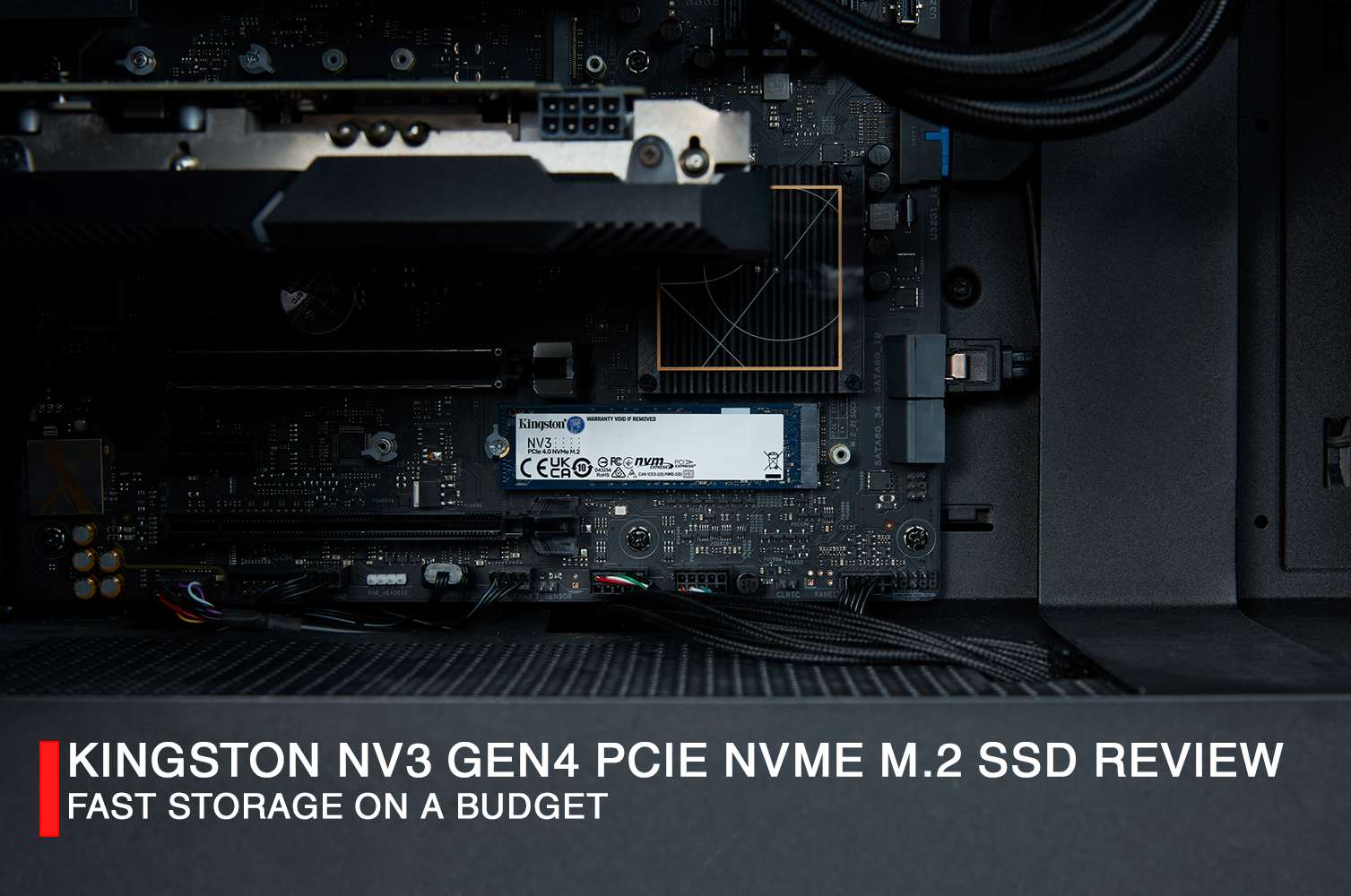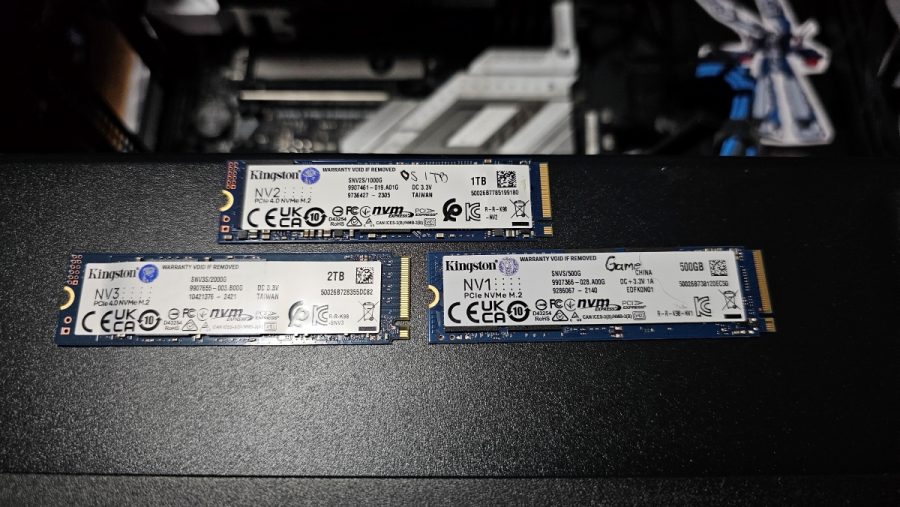
Kingston recently sent over their 3rd generation budget M.2 SSD, the Kingston NV3 for us to review. We’ll see how it performs and compare to the older generation of Kingston NV SSDs like the NV2 SSD we’ve been using in the previous reviews of DRAM-less M.2 SSDs. The new generation NV model promises a maximum read speed of 6000MB/s and maximum write speed of 5000MB/s. We would test for
Table of Contents
Kingston NV3 Packaging and Drive
As a budget level M.2 SSD, all Kingston NV series of SSDs come in a cardboard blister pack to reduce costs further, with the only plastic parts being the M.2 tray and cover, which can be removed from the cardboard and used to store the drive if not in use (or for an older drive). However, the cover doesn’t latch close on the tray and can be lost when storing it.

The SSD sent for review is the 2TB variant. Looking at the specification sheet in Kingston’s website the 1TB and higher models have higher Read speeds while the 2TB and 4TB drives have the highest write speeds of the generation. This is similar to how the NV2 drives were tiered with the lower capacity drives having the lowest read/write speeds while performance scales up the higher the capacity. This time around the Kingston NV3 drives almost doubles the read and write rates to its previous iteration. This could mean that prices for higher performing memory controllers have gone down and logical to equip these in order to be competitive.
| Form Factor | M.2 2280 |
| Interface | PCIe 4.0 x4 NVMe |
| Capacities2 | 500GB, 1TB, 2TB, 4TB3 |
| Sequential Read/Write1 | 500GB – 5,000/3,000MB/s 1TB – 6,000/4,000MB/s 2TB – 4TB3 – 6,000/5,000MB/s |
| NAND | 3D |
| Endurance (Total Bytes Written)4 | 500GB – 160TB 1TB – 320TB 2TB – 640TB 4TB – 1280TB |
| Storage Temperature | -40°C~85°C |
| Operating Temperature | 0°C~70°C |
| Dimensions | 22mm x 80mm x 2.3mm |
| Weight | 7g (All capacities) |
| Vibration Non-operating | 20G (10-1000Hz) |
| MTBF | 2,000,000 hours |
| Warranty/Support5 | Limited 3-year warranty with free technical support |
As a budget level drive, it does lack some of the features like graphene heatsink / label or an aluminum heat spreader like those of higher end models, hence having a good airflow will be a must to control its temperature. This is why with Gen 5 M.2 NVMe drives as of late tend to have either thicker heat spreaders or an active cooling system and can be also another reason for their prices to be on the high side. Higher Read/Write speeds can affect M.2 SSD temperatures. I would recommend installing the drive in a slot with an included motherboard heat spreader.
Benchmark and Testing
The system for testing the drive is on an Intel machine, running an ASUS ROG STRIX Z690A D4 motherboard and Intel Core i5 12000KF processor with 32GB of DDR4 3600 RAM. Also note that the motherboard comes with its own M.2 Heat spreader to control drive temperatures.

Benchmarking a new drive is done by the use of CrystalDiskMark 8. It does net a nice 6000+ MB/s read rate, but always understand that this is due to being a brand-new drive. Hence, I have to compare this to the NV2 drive (1TB) when it was new, just for relative comparison how different the speeds were. As a non DRAM equipped SSD however, it does score low on random read/write tests.

For a more realistic test, I have again used a large file to transfer between drives. The video file I’ve used to transfer is around 9-10GB in size and to simulate a realistic scenario I’m transferring it from a source drive (a slower/older M.2 drive) to the new drive. It doesn’t aim to pull out the maximum speed (since the file’s coming from a HDD as the source), but to see how consistent the file transfer went. With age and use, overall performance will change, but we’re going for the initial peak performance the drive can give.




The Kingston NV3 manages to transfer the file a second faster from the source drive (which is a WD Blue 4TB drive). Comparing it with the file transfer done on the NV2 when it was new then, we’re seeing a better (consistently stable) and quicker (by a second) transfer. While a DRAM-less SSD model, it shows it can as much as handle a stable file transfer without any dips in the transfer speed for this size at least (of course, with time and more files loaded there are going to be some degree of performance drop). If it were to transfer the same file from the NV2 drive this time it would be:

Summary / Conclusion
As seen in the benchmark and real-world test, the Kingston NV3 is faster and have a more consistent performance. Only time and silicon lottery will tell how long the drives would last. Proper care by ensuring drive temperatures is not abused or constantly getting written (an issue with NAND memory, but constant updates to the technology will further improve lifespans) will keep it running for a while longer.
The Kingston NV3 has just been released in the Philippines and has a price starting at Php 3599** (ITW Store) for the 500GB drive, the 2TB is priced at Php 7899**. Its price is indeed competitive against its peers with similar performance and can even be cheaper. It is however pricier than the NV2 series, but comparing the large bump in overall performance, the difference in their cost is negated.
The Kingston NV3 is a solid follow up to its lineage of budget M.2 SSD NVMe drives for either PC or laptops. The increase in speed comes in at the right time when Gen 4 PCIe NVMe controllers are mature, and cost is at a more reasonable amount.
*Update*: Kingston has just updated warranty terms for this product and now carries a 5-year warranty.
** Prices I found vary between local sellers and can be lower or higher in other stores that I might not have found in stock





